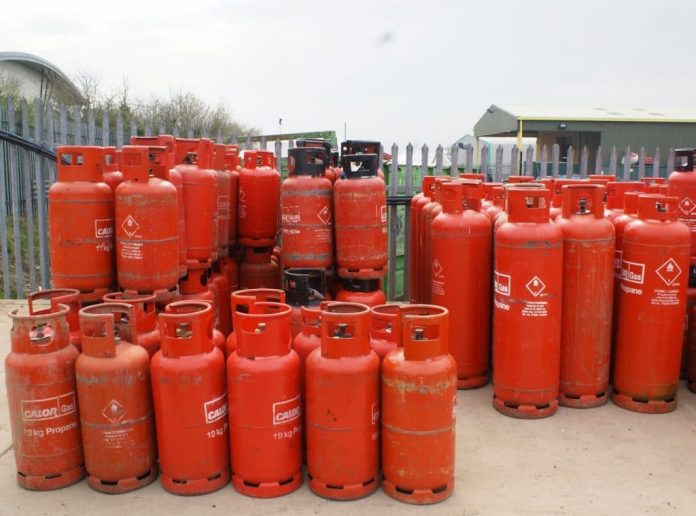By Daniel Akinte
Ikuemonisan Ademibo, hailing from South-West, Oroyo, Ondo, has maintained a perfect attendance record since his resumption at Adekunle Ajasin University Akungba Akoko (AAUA).
However, the recent spike in gas prices has posed a significant challenge to his academic dedication. As a diligent 300 level mass communication student, he finds himself grappling with the sudden increase in gas costs on campus.
“As a student, my foremost priority is my education, and I’ve always been committed to attending all my classes without fail since I set foot on campus. But lately, the soaring gas prices have disrupted my routine. I’ve had to resort to using charcoal grills, which are not only time-consuming but also overly taxing for a student like me,” he lamented.

Ademibo expressed his frustration over the impact of the gas price hike on his ability to engage in philanthropic activities and maintain his reputation among his villa mates.
“The cost of gas per kilogram has surged from 1,200 naira to 2,200 naira. My villa mates used to see me as a generous and caring individual, but the situation has taken a toll on me. Even if I manage to refill a gas cylinder, I hesitate to share it with others due to the scarcity. Consequently, people have begun to perceive me differently, assuming that I’ve changed because of these circumstances,” he explained.
Genesis of Nigeria’s Gas Price Surge: Factors and Consequences
On August 10th, 2023, Olatunbosun Oladapo, President of the Nigerian Association of Liquefied Petroleum Gas Marketers, warned consumers of impending price hikes, which were implemented a week later.
Since then, Nigerians have grappled with a surge in prices, soaring from N600 to N1200. Oladapo attributed the price increase to rising international prices, high tax rates, vessel costs, forex scarcity, and naira devaluation.
Furthermore, the Nigeria Liquefied Natural Gas (NLNG) Ltd. highlighted the shortage of Foreign Exchange (FX) and the impact of Federal Government’s import duties and Value Added Tax (VAT) as key factors driving up the cost of cooking gas in Nigeria.
Meanwhile, data from the International Energy Agency reveals that global gas demand increased by 0.5% in 2023, fueled by growth in China and North America, while Europe experienced a 7% decline. China regained its position as the top LNG importer, while European consumption hit its lowest level since 1995 due to the expansion of renewables. Looking ahead to 2024, the report forecasts a 2.5% growth in gas demand, driven by colder weather and lower prices, particularly in industrial sectors.
However, despite these global trends, some regions in Nigeria have experienced exorbitant gas prices, reaching as high as 2,200 and 2,500 naira, rendering it unaffordable for many consumers.
Meanwhile, the recent hike has taken a significant toll and caused inconvenience for the students of Adekunle Ajasin University Akungba Akoko, Ondo State.
Students Struggle: Navigating the Turbulent Waters of Rising Gas Prices
Among the affected students, Idorenyin Emmanuel, a dedicated 300-level Chemistry Education student, embarked on his academic journey with zeal and determination, his eyes set on the horizon of a promising future.
Like a sudden tempest on a placid sea, the surge in fuel costs sent shockwaves through his meticulously structured routine, leaving him adrift in a sea of uncertainty. No longer could he afford the luxury of cooking with gas, as the once-accessible commodity now loomed beyond his financial reach.
“It’s traumatizing, since the gas just suddenly skyrocketed to 1,200 Naira, I’ve been using a coal pot to cook because at the same time, money is not coming. Everything is just tough now.” He bemoaned.

Sharing her plight, Farojoye Nancy of the Mass communication department said, “Due to the recent GAS increments, a lot of students in our school are facing a lot of little difficulties. To me, my standard of living was somehow tough because at the moment, the amount of which I can use in filling 2 kg before, is just like 1 kg now.”
In a beacon of help, Nancy said, “If the government should try as a father, authority, a body controlling the country, they should at least bring back the fuel subsidy. They should subsidize the fuel. They should not remove the fuel subsidy.”
“As a student, we are all trying to cope with life,” Nancy lamented. “The government should please find a solution to the inflation that we are experiencing in Nigeria because it’s also affecting students academically and their finances.”
“We Can’t Cook Beans With Gas Anymore”, Students Grieve
Compared to Mr. Emmanuel and Miss Nancy’s complaints about the increment in gas price, some other students who enjoy eating beans on a daily basis can no longer afford to use gas for cooking beans.
For many students like Adewuyi Suzan, a 300 level student of the Accounting department, the days of hearty bean stews cooked over a gas flame were but a distant memory, replaced by the harsh reality of inflated prices and dwindling resources.
“We started managing our gas because the hike in gas price has affected me. In short, we can’t cook beans using gas any longer except for alternatives like coal pot.”
For Suzan and her peers, the once-familiar norm of preparing meals had become a laborious task, fraught with uncertainty and financial strain.
“Due to this increase in Gas, Nigerian students and parents are going through a lot. If things continue this way in the next five years, a middle-class won’t be able to send their children to school.” She said
Students Seek Relief Amidst Adversity
Amidst the pervasive gloom, voices of dissent arose, echoing the sentiments of students like Ogunyemi Olalekan, Keita Ibrahim, and Sunday Excellent.
Their words, tinged with frustration and despair, painted a poignant picture of the collective struggle faced by the student community in the wake of soaring gas prices.

“Honestly, the increment in gas price has been kind of sad because personally, I love to eat beans but due to the increment effect in Gas price, I can’t cook beans with Gas at the moment except for me to use coal pot,” lamented Ogunyemi Olalekan, 400 level Accounting student.
“The reason why I changed from gas to coal pot is because of the increment of gas money, Who is that rich in this type of economy that we are in now?” Keta Ibrahim
“It has affected me a lot,” confessed Sunday Excellent, a 100 level student of Public Administration, “Things are becoming tougher.” He grieved.
A Ripple Effect of Economic Strain
In this escalating gas prices, the ripples of economic strain spread far and wide, leaving no corner of campus untouched.
Rotua Ruth, a 200 level Biology Education student hailing from Delta State, spoke of the pervasive stress and financial strain that gripped the student populace, casting a shadow of uncertainty over their collective future.
“The increment in gas price has affected a lot of people especially on students which has led to strenuous stress and has put a financial strain on the student.”

“Our Sales and Gain are Affected.” Vendor Laments
A Gas vendor, who preferred to remain anonymous, highlighted the negative impact of the gas price hike, linking it to the removal of fuel subsidy. He stated, “this hike in price is not only affecting Gas but also everything.”
Furthermore, he explained, “we know that it’s petrol we use most to produce a lot of things. On the Gas aspect, we’re not the producer.” He emphasized the cost implications of production and transportation, leading to increased prices.
He added, “Our sales and gain are affected. The amount we sell on a daily basis has dropped compared to the previous sales.”
Regarding a solution, he suggested, “if the government can find a replacement or an alternative to the fuel subsidy, then, the citizens will joyfully embrace the development since it will improve their standard of living.”
Another vendor, Silver Gas in Akungba, shared insights into the factors influencing the gas price hike, highlighting increased demand, especially for generator use. He emphasized the widespread impact on both the poor and the rich, noting the lack of student protests as an indicator of their perception of the issue.
“The money for buying bottles of Gas has skyrocketed and my sales per day has dropped so low. Before, I did sell more than two bottles but at the moment, I hardly sell half of a bottle,” he lamented.
He suggested that affected parties should organize peaceful protests to raise awareness of the gas price issue and urged the government to take action to alleviate the suffering.
Expert wades in
Mr. Oredola Adeola, Manager and Partner of EnergyDay Nigeria, shed light on the factors contributing to the gas price hike, emphasizing the impact of demand and the lack of adequate infrastructure and suppliers.
“Well, the first thing is, the fact that GAS is designed to achieve cheaper, available, and economically, what I mean, environmentally, it is not out of place to expect that demand will have to be cheaper. Because more people are taking on that consumption of GAS,” he explained, highlighting the economic dynamics of supply and demand.
He drew a comparison between gas and Garri, noting that while both are essential, the demand for gas affects its pricing due to economic factors. “The rules of economy, demand and supply. If the demand is as big as supply, there will be a price hike,” he stated.
Addressing the issue of infrastructure and supply, Mr. Adeola pointed out the shortage of gas suppliers relative to Nigeria’s population. “We just have a few players. They are not even up to 10. And look at Nigeria, we are over 200 million,” he remarked, underscoring the imbalance between demand and supply.
He also highlighted the problem of hoarding due to panic buying, exacerbating the scarcity of gas. In his advice, Mr. Adeola emphasized the need for more investment in the gas sector to meet the growing demand. “Either attractive or not attractive. It is only in the gas sector that you can put your money through it, and make your money back. Because the demand is there,” he urged.
He urged the government to incentivize investors and address the challenges in the gas sector to ensure adequate supply and affordability for consumers.




